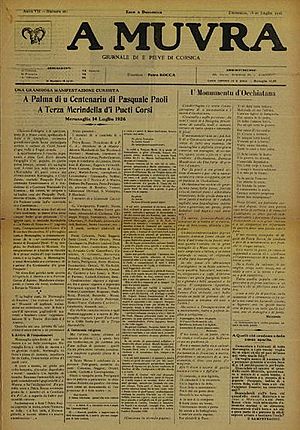Rocca Petru facts for kids
Petru Rocca (born in 1887, died in 1966) was a poet and writer from Corsica. He strongly believed his island should be free from France. At first, he thought Corsica should join Italy. But after World War II, he worked for Corsica to have more autonomy, meaning it would govern itself more while still being part of France.
Contents
Petru Rocca's Life Story
Early Life and Ideas
Petru Rocca, known as Petru in the Corsican language, was a talented writer from a young age. He wrote for a magazine in Corsica called A Tramuntana. During World War I, he wrote about the war and was given the French Legion of Honor award for his work.
In May 1920, Rocca began working with a literary magazine called A Muvra. This magazine was very important for Corsican culture in the first half of the 1900s. In 1922, he started a political group called the "Partitu Corsu d'Azione." This group wanted Corsica to have more self-rule, similar to a group in Sardinia.
Later, in the late 1920s, he created another group, the "Partito autonomista di Corsica." He worked with Domenico Parlotti and Dr. Croce, who was in charge of the state archives in Corsica.
Changing Views
As the 1930s went on, Rocca's ideas about Corsica's future began to change. He slowly moved from wanting Corsica to be self-governing within France to supporting the idea of Corsica joining Italy. He supported the views of Petru Giovacchini, a leader who believed Corsica should be part of Italy. Giovacchini created a main group in Corsica that supported this idea.
In 1938, the French government took away Rocca's French Legion of Honor medal. This happened because of his support for Italian ideas about uniting their country. In 1939, A Muvra magazine started publishing articles that blamed Jewish people for France's control over Corsica. Because of this, the magazine was quickly shut down.
After the War
During World War II, Rocca supported the ideas of Benito Mussolini, who was the leader of Italy. Mussolini wanted Corsica to become part of the Kingdom of Italy. When Italian soldiers took control of Corsica in 1942, Rocca was even suggested to become the "Governor" of Corsica if it joined Italy. After Italy was defeated in September 1943, French officials caused problems for him.
In 1946, he faced serious consequences and was sent away for 15 years. He was sent to French Guiana. When he was released, he quickly started his original "Partito autonomista di Corsica" group again.
In 1953, Rocca created an organization to protect the Corsican language. He asked France to recognize the Corsican people and their language. He also asked for a university to be built in Corte, Corsica. Until he passed away in 1966, Petru Rocca was a strong supporter of Corsican nationalism, which means he wanted Corsica to have its own strong identity and control its own future.
His Writings
Petru Rocca wrote many books and plays. Here are some of them:
- Les corses devant l'anthropologie, 1913
- Pruverbii, massime è detti corsi (Corsican Proverbs, Maxims and Sayings), 1921
- A pignatta, cumedia di Plautu (A Play by Plautus), 1924
- Storia populare di Corsica (Popular History of Corsica), 1930
- Una Vittoria Autonomista. L'Assemblea di i "Stati Generali di Corsica" (An Autonomist Victory. The Assembly of the "States General of Corsica"), 1934
- Quaderni di u Cursismu (Notebooks of Corsicanism), 1935
- Parlà d'Aghjacciu, puesii (Speaking of Ajaccio, Poems), 1955
- Tempi è tempi (Times and Times), 1963
Related pages
 | Bessie Coleman |
 | Spann Watson |
 | Jill E. Brown |
 | Sherman W. White |


